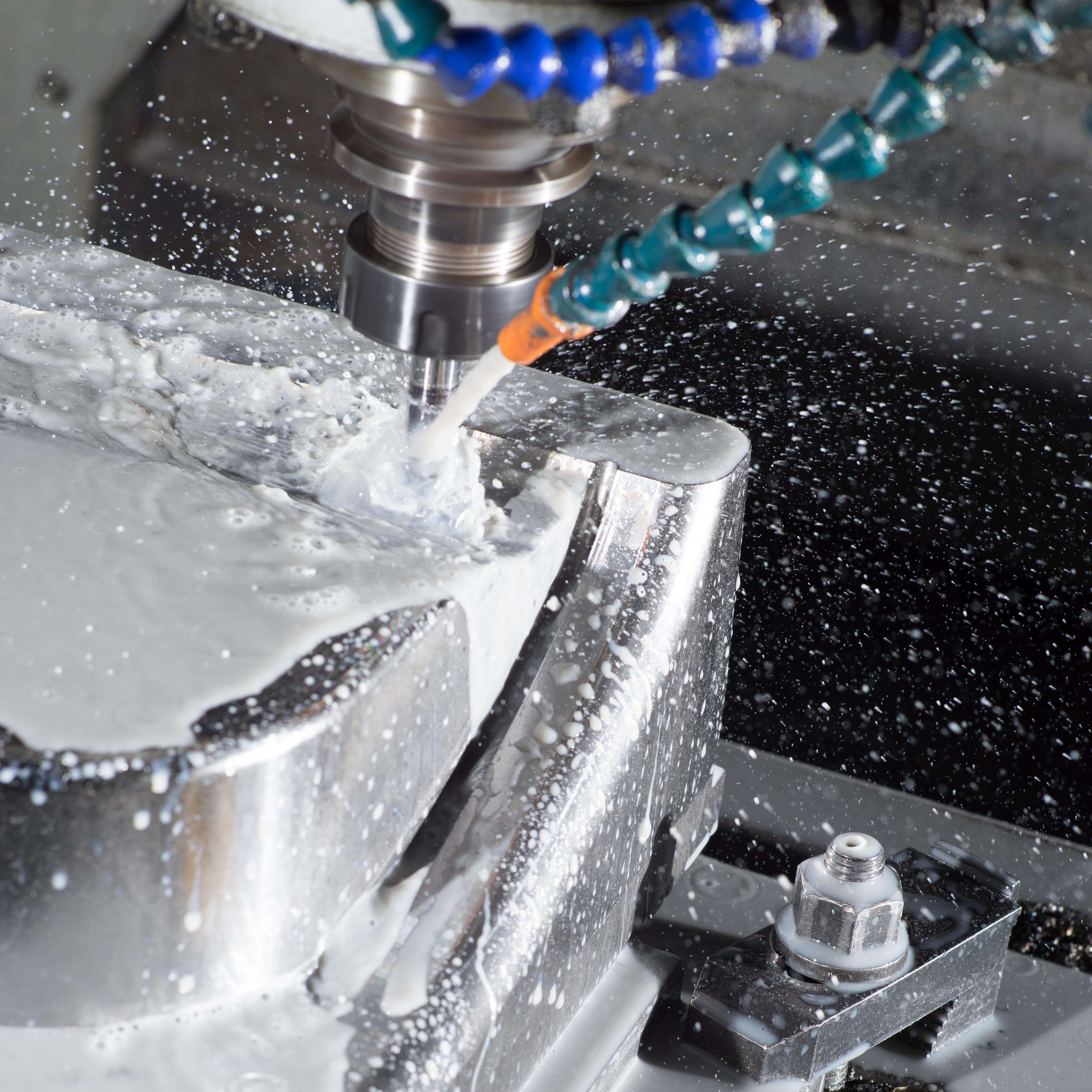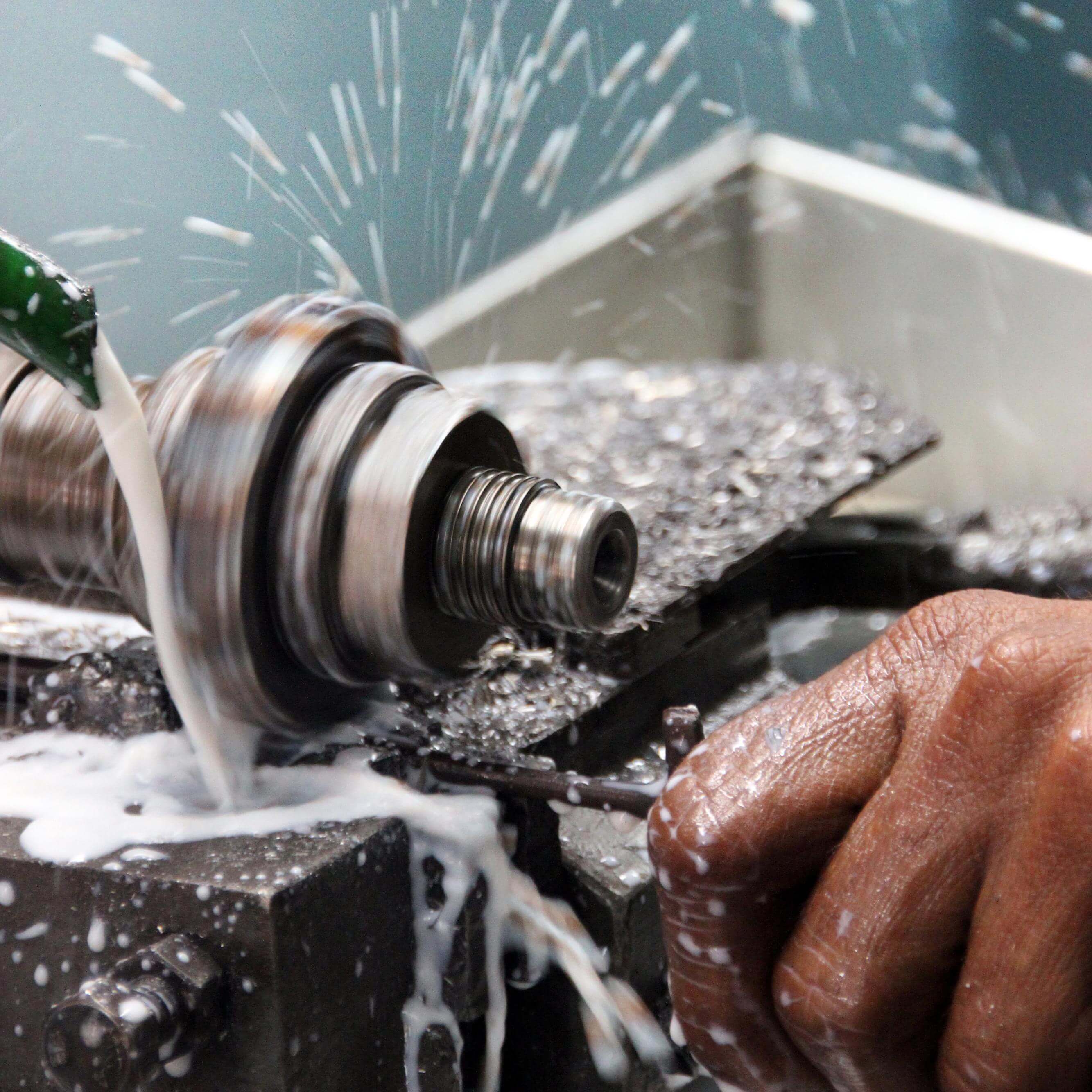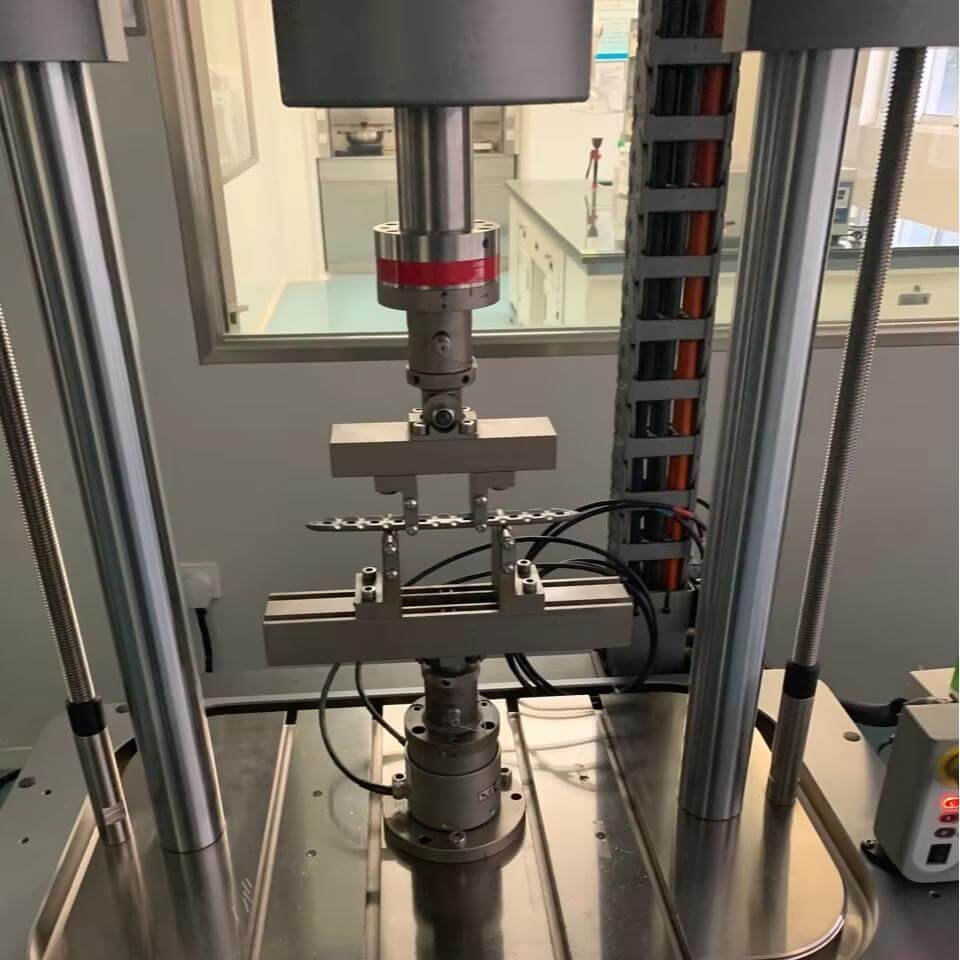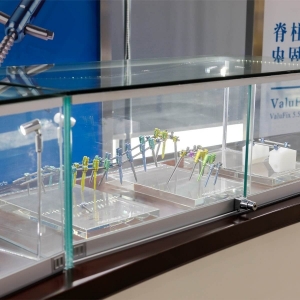Humeral Interlocking Nail Instrument Set Video
Humeral Interlocking Nail Instrument Set PDF
 Humeral Interlocking Nail Instrument Set.pdf
Humeral Interlocking Nail Instrument Set.pdf
Humeral Interlocking Nail Instrument Set Specification
| Products | Pictures | Details |
Humeral Interlocking NailInstrument Set (PN:RQG101) |   | 1 | N-01-01 | Drill Bit 5.2mm | 1 |
| 2 | N-01-02 | Open Wrench | 1 |
| 3 | N-01-03 | Tap 3.5mm | 1 |
| 4 | N-01-04 | Distal Positiong Frame | 1 |
| 5 | N-01-05 | Depth Gague 0-60mm | 1 |
| 6 | N-01-06 | Drill Bit 2.9*250mm | 1 |
| 7 | N-01-07 | Drill Bit 5.2*300mm | 1 |
| 8 | N-01-08 | Reamer 8.5*340mm | 1 |
| 9 | N-01-09 | Reamer 8.0*340mm | 1 |
| 10 | N-01-10 | Reamer 7.5*340mm | 1 |
| 11 | N-01-11 | AWL | 1 |
| 12 | N-01-12 | Sleeve | 1 |
| 13 | N-01-13 | Screwdriver SW2.5 | 1 |
| 14 | N-01-14 | Sleeve | 1 |
| 15 | N-01-15 | Quick Coupling T-Handle | 1 |
| 16 | N-01-16 | Sighting Device Handle | 1 |
| 17 | N-01-17 | Nail Connector | 1 |
| 18 | N-01-18 | Distal Guider | 1 |
| 19 | N-01-19 | Proximal Guider | 1 |
| 20 | N-01-20 | Fixed Connector | 1 |
| 21 | N-01-21 | Location Rod | 1 |
| 22 | N-01-22 | Drill Sleeve | 1 |
| 23 | N-01-23 | Hex Wrench | 1 |
| 24 | N-01-24 | Gauge Cannula | 1 |
| 25 | N-01-25 | Universal Joint | 1 |
| 26 | N-01-26 | Guide Rod | 1 |
| 27 | N-01-27 | Hammer | 1 |
| 28 | N-01-28 | Guide Wire | 1 |
| 29 | N-01-29 | Aluminium Box | 1 |
Advantages of XC Medico's Products

CNC preliminary processing
The computer numerical control technology is used to precisely process orthopedic products. This process has the characteristics of high precision, high efficiency, and repeatability. It can quickly produce customized medical devices that conform to the human anatomical structure and provide patients with personalized treatment plans.
| 
Product polishing
The purpose of orthopedic products polishing is to improve the contact between the implant and human tissue, reduce stress concentration, and improve the long-term stability of the implant. | 
Quality Inspection
The mechanical properties test of orthopedic products is designed to simulate the stress conditions of human bones, evaluate the load-bearing capacity and durability of implants in the human body, and ensure their safety and reliability. |

Product package
Orthopedic products are packaged in a sterile room to ensure that the product is encapsulated in a clean, sterile environment to prevent microbial contamination and ensure surgical safety.
|  Product Warehouse Product Warehouse
The storage of orthopedic products requires strict in-and-out management and quality control to ensure product traceability and prevent expiration or wrong shipment. |  Sample Room Sample Room
The sample room is used to store, display and manage various orthopedic products samples for product technology exchanges and training. |
The Process To Cooperate With XC Medico
1. Ask Xc Medico Team For Humeral Interlocking Nail Instrument Set Product Catalog.
2. Choose Your Interested Humeral Interlocking Nail Instrument Set Product.
3. Ask For A Sample To Test Humeral Interlocking Nail Instrument Set Quality.
4.Make An Order Of Xc Medico's Humeral Interlocking Nail Instrument Set.
5.Become A Dealer Of Xc Medico's Humeral Interlocking Nail Instrument Set.
The Advantages To Be A Dealer Or Wholesaler Of XC Medico
1. Better Purchase Prices Of Humeral Interlocking Nail Instrument Set.
2.100% The Highest Quality Humeral Interlocking Nail Instrument Set.
3. Less Ordering Efforts.
4. Price Stability For The Period Of Agreement.
5. Sufficient Humeral Interlocking Nail Instrument Set.
6. Quick And Easy Assessment Of XC Medico's Humeral Interlocking Nail Instrument Set.
7. A Globally Recognized Brand - XC medico.
8. Fast Access Time To XC Medico Sales Team.
9. Additional Quality Test By XC Medico Team.
10. Track Your XC Medico Order From Start To Finish.
Humeral Interlocking Nail Instrument Set Concept
Humeral interlocking nail instrument sets are specialized surgical toolkits designed for the insertion and fixation of humeral intramedullary nails, which are used to treat fractures of the humerus, and the upper arm bone. These sets typically include a variety of instruments, such as reamers, drivers, insertion instruments, etc.
Humeral Interlocking Nail Instrument Set Features
Intramedullary Nail Design
At the core of the instrument set is the intramedullary nail itself. Made from titanium or stainless steel, the nail is designed to fit snugly within the humeral canal. The design is typically straight or slightly curved to match the natural anatomy of the humerus. The nail’s length and diameter are available in various sizes to accommodate different patient anatomies and fracture types.
Proximal and Distal Locking Mechanism
The locking screws are an integral feature of the system, providing enhanced stability. The proximal locking screws, placed near the shoulder, secure the upper part of the nail, while the distal locking screws, placed near the elbow, secure the lower portion. This interlocking mechanism prevents rotational and axial displacement, ensuring that the fracture remains stabilized.
Reaming System
The instrument set includes a reaming system that allows for careful preparation of the medullary canal. Reaming is performed to create an appropriate path for the insertion of the intramedullary nail, ensuring optimal fit and contact with the bone. This step is crucial in preventing nail migration and enhancing the load-sharing properties of the implant.
Targeting Device
The set includes a targeting guide or jig that assists the surgeon in accurately placing the locking screws. Proper placement is critical to avoid malalignment and to ensure the mechanical stability of the nail. The targeting device ensures that the screws are inserted at the correct angles, aligning with the pre-drilled holes in the nail.
Minimally Invasive Approach
The Humeral Interlocking Nail Instrument Set is designed to facilitate a minimally invasive surgical technique. This reduces the size of the incisions required for nail insertion, minimizes soft tissue damage, and lowers the risk of complications such as infections and scarring. The minimally invasive approach also shortens recovery time, allowing patients to resume functional activities sooner.
Customizable Components
The instrument set often includes interchangeable components, allowing the surgeon to adjust the procedure to the specific needs of the patient. The nails and screws come in various lengths and diameters, accommodating a wide range of humeral shaft fractures and patient anatomies.
Humeral Interlocking Nail Instrument Set Advantages
Superior Stability
One of the most significant advantages of the humeral interlocking nail is its ability to provide superior stability in both rotational and axial planes. This is particularly important in treating fractures of the humeral shaft, where maintaining proper alignment is critical for successful healing. The locking screws at both ends of the nail ensure that the fracture fragments remain securely positioned, even under physiological loads.
Load Sharing
Unlike plate fixation, which bears most of the load during the healing process, the intramedullary nail allows for load-sharing between the implant and the bone. This reduces the stress on the implant and encourages natural bone healing. Load sharing also decreases the risk of implant failure or fatigue over time, especially in patients who are expected to bear weight on the arm early in the postoperative period.
Minimally Invasive Surgery
The humeral interlocking nail can be inserted through a minimally invasive surgical technique, which offers several benefits
Reduced soft tissue trauma
Smaller incisions and less tissue dissection reduce the risk of complications such as infections or delayed wound healing.
Faster recovery
Patients can typically resume range-of-motion exercises and activities of daily living sooner than those treated with more invasive methods.
Reduced blood loss
The minimally invasive approach results in less intraoperative blood loss, which is especially beneficial for elderly or medically compromised patients.
Precautions for the Humeral Interlocking Nail Instrument Set
Proper Implant Selection
Choosing the appropriate nail size and length is critical for the success of the procedure. Nails that are too long or too short can lead to complications such as nail migration or malalignment. Surgeons must carefully evaluate preoperative imaging to select the most suitable implant for the patient’s anatomy and fracture pattern.
Accurate Screw Placement
The placement of the locking screws is a technically demanding aspect of the procedure. If the screws are not placed correctly, it can result in malrotation or instability. The use of a targeting device is essential to ensure that the screws are positioned accurately within the pre-drilled holes of the nail.
Avoiding Joint Involvement
Care must be taken to avoid extending the nail into the shoulder or elbow joints, as this can lead to joint stiffness or damage to the articular cartilage. In patients with fractures close to the joint, alternative fixation methods may be considered to prevent iatrogenic injury.
Addressing Preexisting Conditions
In patients with osteoporosis or other conditions that affect bone quality, the humeral interlocking nail may require additional support, such as the use of bone grafts or cement augmentation, to ensure adequate fixation.
The Future Market For Humeral Interlocking Nail Instrument Set
The humeral interlocking nail instrument set market will witness significant growth in the coming years due to advancements in orthopedic technology, an aging population, an increase in the number of fractures, and the need for minimally invasive orthopedic surgical solutions. These factors are reshaping the landscape of trauma care and orthopedic surgery, positioning the humeral interlocking nail instrument set as an essential component of fracture management in the coming years.
Summary
In conclusion, humeral interlocking nail instrument sets are essential tools for orthopedic surgeons treating humeral fractures. By selecting a high-quality instrument set, surgeons can improve the efficiency, accuracy, and outcomes of their procedures.
English
Русский
简体中文
繁體中文
العربية
Français
Español
Português
Deutsch
italiano
日本語
한국어
Nederlands
Tiếng Việt
ไทย
Polski
Türkçe
አማርኛ
ພາສາລາວ
ភាសាខ្មែរ
Bahasa Melayu
ဗမာစာ
தமிழ்
Filipino
Bahasa Indonesia
magyar
Română
Čeština
Монгол
қазақ
Српски
हिन्दी
فارسی
Kiswahili
Slovenčina
Slovenščina
Norsk
Svenska
українська
Ελληνικά
Suomi
Հայերեն
עברית
Latine
Dansk
اردو
Shqip
বাংলা
Hrvatski
Afrikaans
Gaeilge
Eesti keel
Māori
සිංහල
नेपाली
Oʻzbekcha
latviešu
অসমীয়া
Aymara
Azərbaycan dili
Bamanankan
Euskara
Беларуская мова
भोजपुरी
Bosanski
Български
Català
Cebuano
Corsu
ދިވެހި
डोग्रिड ने दी
Esperanto
Eʋegbe
Frysk
Galego
ქართული
guarani
ગુજરાતી
Kreyòl ayisyen
Hausa
ʻŌlelo Hawaiʻi
Hmoob
íslenska
Igbo
Ilocano
Basa Jawa
ಕನ್ನಡ
Kinyarwanda
गोंगेन हें नांव
Krio we dɛn kɔl Krio
Kurdî
Kurdî
Кыргызча
Lingala
Lietuvių
Oluganda
Lëtzebuergesch
Македонски
मैथिली
Malagasy
മലയാളം
Malti
मराठी
ꯃꯦꯇꯥꯏ (ꯃꯅꯤꯄꯨꯔꯤ) ꯴.
Mizo tawng
Chichewa
ଓଡ଼ିଆ
Afaan Oromoo
پښتو
ਪੰਜਾਬੀ
Runasimi
Gagana Samoa
संस्कृत
Gaelo Albannach
Sepeti
Sesotho
chiShona
سنڌي
Soomaali
Basa Sunda
Wikang Tagalog
Тоҷикӣ
Татарча
తెలుగు
ትግንያውያን
Xitsonga
Türkmençe
संस्कृत
ئۇيغۇرچە
Cymraeg
isiXhosa
ייִדיש
Yorùbá
isiZulu





























 Product Warehouse
Product Warehouse Sample Room
Sample Room













